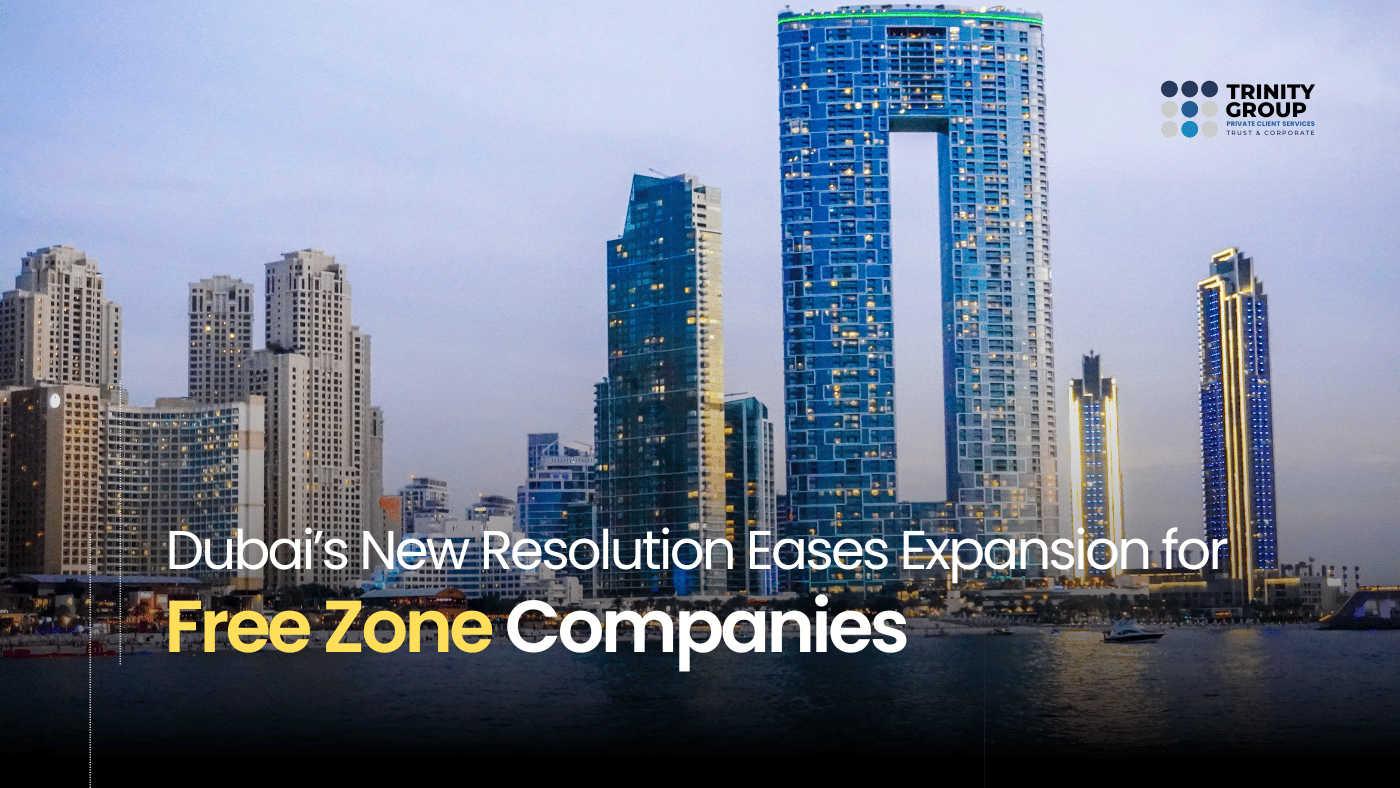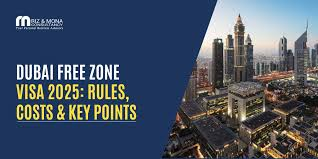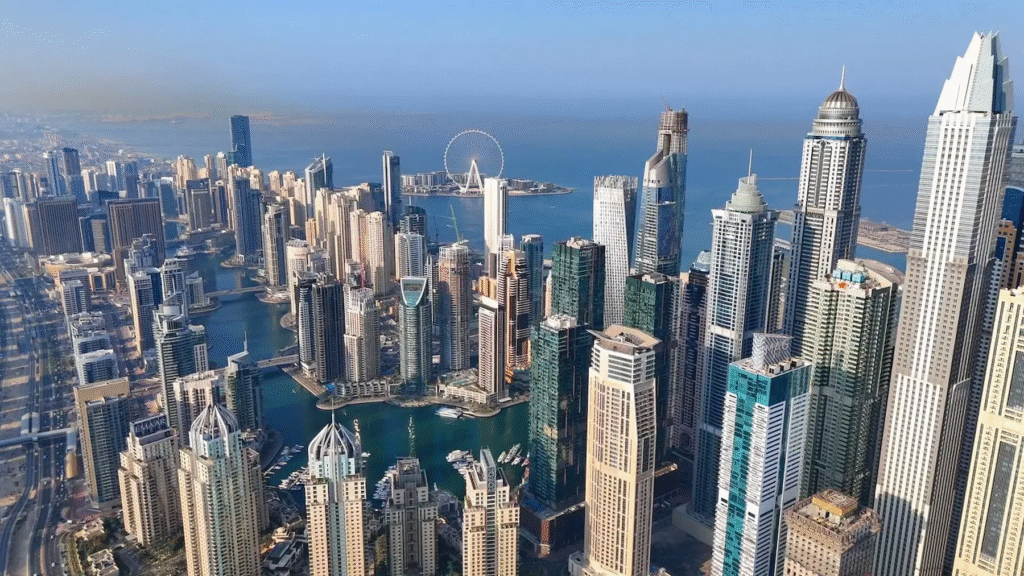Now Reading: Real Estate: 7 Key Rules for Free Zone Branch Expansion in 2025
-
01
Real Estate: 7 Key Rules for Free Zone Branch Expansion in 2025
Real Estate: 7 Key Rules for Free Zone Branch Expansion in 2025

Table of Contents
Free Zone: Dubai’s real estate market, a global hub with 6-9% rental yields and no capital gains tax, sustains AED 761 billion ($207.2 billion) in 2024 transactions despite a 15% price correction forecast for 2025, per Fitch Ratings. Free zones like Dubai Multi Commodities Centre (DMCC), Dubai International Financial Centre (DIFC), and Jebel Ali Free Zone (JAFZA) offer 100% foreign ownership and 0% corporate tax for Qualifying Free Zone Persons (QFZPs), making them ideal for real estate firms expanding branches to manage AED 1 million ($272,259) portfolios or broker deals.
Governed by Federal Decree-Law No. 32 of 2021 and Resolution No. (11) of 2025, free zone expansion aligns with Dubai’s Economic Agenda D33 and Real Estate Strategy 2033. This guide, crafted in clear, SEO-friendly language with an engaging tone, outlines seven key rules for U.S. real estate investors expanding free zone branches in 2025, supported by data, legal insights, and risk analysis.
7 Key Rules for Free Zone Branch Expansion
1. Obtain Free Zone Authority Approval
Free zone authorities (e.g., DMCC, DIFC) require pre-approval for branch setups, verifying compliance with activities like real estate brokerage or property management, per DMCC guidelines. Approval takes 5-10 days, with fees of AED 5,000-10,000 ($1,361-2,723).
- Rule: Submit a business plan, parent company license, and KYC documents to the free zone portal. Ensure activities align with Dubai Land Department (DLD) regulations.
- Investor Benefit: U.S. firms establish DMCC branches to manage AED 1 million ($272,259) JVC portfolios, earning 2-5% commissions ($5,445-13,613).
- Example: A $5,445 DMCC approval fee enables a branch to broker $544,518 Dubai Marina deals, yielding $10,890 commission.
- Source: DMCC
2. Comply with Corporate Tax Exemptions

Under Federal Decree-Law No. 47 of 2022, QFZPs in free zones enjoy 0% corporate tax if non-qualifying revenue (e.g., mainland UAE income) is below 10% and audited, per FTA. Non-compliance triggers 9% tax on profits above AED 375,000 ($102,103).
- Rule: Register as a QFZP with FTA by March 31, 2025, and file annual audits by September 30, 2025. Maintain separate free zone/mainland accounts.
- Investor Benefit: U.S. firms save 9% tax on $27,226 profits from AED 2 million ($544,518) Palm Jumeirah deals, boosting ROI.
- Example: A DMCC branch earning $27,226 saves $2,450 in taxes, reinvesting in $163,355 JVC units yielding $11,435.
- Source: FTA
3. Secure RERA Brokerage Licensing
Branches engaging in brokerage must obtain a Real Estate Regulatory Agency (RERA) license, costing AED 5,000-15,000 ($1,361-4,084) annually, per DLD. Resolution No. (11) of 2025 allows free zone firms to operate mainland under RERA oversight.
- Rule: Complete RERA’s training (AED 3,000, $816) and register with DLD by Q1 2025. Non-compliance risks AED 50,000 fines.
- Investor Benefit: U.S. firms broker AED 1 million ($272,259) Business Bay deals, earning 2% commissions ($5,445) with 6-7% yields.
- Example: A $2,723 RERA license enables $10,890 commission on a $544,518 Dubai Hills sale, supporting $38,116 portfolio yields.
- Source: DLD
4. Adhere to Anti-Money Laundering (AML) Regulations
Federal Law No. 20 of 2018 mandates KYC/AML checks for real estate transactions above AED 100,000 ($27,226), enforced by VARA and CBUAE. Free zone branches must use licensed banks and report suspicious activities, with penalties up to AED 5 million ($1.36 million).
- Rule: Implement KYC for clients buying AED 800,000 ($217,807) Dubai South units, submitting reports to FTA by Q1 2025.
- Investor Benefit: U.S. firms avoid $13,613 fines, ensuring secure 6-7% yields on $217,807 portfolios via Unique Properties.
- Example: A DMCC branch clears KYC for a $272,259 deal, securing $5,445 commission and $19,058 yield.
- Source: VARA
5. Register for VAT if Applicable
Branches with taxable supplies (e.g., brokerage fees, commercial management) exceeding AED 375,000 ($102,103) must register for 5% VAT by March 31, 2025, per FTA. Residential services are exempt, but commercial leases incur VAT.
- Rule: File quarterly VAT returns by April 28, 2025, using FTA’s e-portal. Penalties: AED 10,000 for late registration, AED 50,000 for non-compliance.
- Investor Benefit: U.S. firms recover VAT on $272,259 Business Bay deals, boosting 2-5% commissions ($5,445-13,613).
- Example: A $5,445 VAT recovery on a $272,259 deal adds to $19,058 yield, offsetting $1,361 in fees.
- Source: FTA
6. Lease or Purchase Free Zone Office Space
Free zone branches require a physical office, with DMCC flexi-desks starting at AED 15,000 ($4,084) annually or DIFC offices at AED 50,000 ($13,613), per Shuraa. Leases align with visa quotas (3-6 per desk).
- Rule: Secure office space and trade license (AED 10,000-20,000, $2,723-5,445) by Q1 2025, ensuring compliance with free zone tenancy laws.
- Investor Benefit: U.S. firms manage $544,518 Palm Jumeirah portfolios from DMCC, supporting 6-8% yields and Golden Visa eligibility.
- Example: A $4,084 DMCC flexi-desk supports $10,890 commission on a $544,518 deal, adding to $38,116 yield.
- Source: Shuraa
7. Comply with U.S. Tax Obligations

U.S. investors must report free zone branch income under FATCA via Forms 5471, 1116, and Schedule C, with income taxed at 10-37% and capital gains at 0-20%, per IRS. Foreign Tax Credits (FTC) offset UAE corporate tax (not VAT).
- Rule: File U.S. taxes by April 18, 2025 (or June 15 with extensions), claiming FTC for UAE taxes. Non-compliance penalties: $10,000 per unreported entity.
- Investor Benefit: U.S. firms offset $2,450 UAE tax on $27,226 DMCC profits, boosting $11,435 yields on $163,355 JVC units via BrightTax.
- Example: A $27,226 DMCC profit yields $1,905 after FTC, supporting $19,058 portfolio returns.
- Source: IRS
Legal and Tax Framework
- UAE Legal Framework:
- Free Zone Operations: Governed by Federal Decree-Law No. 32 of 2021 and Resolution No. (11) of 2025, allowing mainland activities under RERA.
- Corporate Tax: 0% for QFZPs, 9% on taxable income above AED 375,000 ($102,103). File by September 30, 2025.
- VAT: 5% on taxable supplies above AED 375,000, exempt for residential. Register by March 31, 2025.
- AML: KYC mandatory under Federal Law No. 20 of 2018. Penalties: AED 5 million.
- Fees: DMCC setup AED 20,000-50,000 ($5,445-13,613), RERA license AED 5,000-15,000.
- U.S. Tax Framework:
- Reporting: Declare income via Forms 5471, 1116, Schedule C under FATCA. Penalties: $10,000 per violation.
- FTC: Offset UAE corporate tax against U.S. liability.
- FEIE: $130,800 exclusion for earned income, not passive income.
- Freehold Ownership: 100% ownership in zones like Dubai Marina, per Law No. 7 of 2006.
- Golden Visa: AED 2 million ($544,518) investments qualify for 10-year residency.
Risks and Mitigation
- Oversupply: 210,000–250,000 units by 2026 may deepen price declines. Focus on high-yield zones like JVC and Business Bay.
- Compliance Costs: VAT, AML, and RERA fees may reach AED 50,000 ($13,613). Engage Farahat & Co..
- U.S. Tax Burden: IRS reporting reduces returns. Maximize FTC with BrightTax.
- Regulatory Shifts: Free zone rules may tighten in 2025. Monitor DMCC and FTA.
- Market Competition: Over 110,000 new investors in 2024 increase rivalry. Target niche markets like off-plan Dubai South.
Step-by-Step Guide for U.S. Investors
- Research Free Zones: Evaluate DMCC, DIFC, and JAFZA via DMCC for real estate activities.
- Obtain Approval: Submit business plans and KYC to free zone portals by Q1 2025, budgeting $2,723-5,445.
- Secure RERA License: Complete training and register with DLD by Q1 2025 via Dubai REST.
- Set Up Office: Lease DMCC flexi-desks for $4,084 annually, ensuring visa quotas via Shuraa.
- Ensure Tax Compliance: Register as QFZP with FTA by March 31, 2025, and file U.S. taxes by April 18, 2025, with FTC via BrightTax.
- Implement AML: Conduct KYC for $272,259 deals via Unique Properties, reporting to FTA.
- Monitor Returns: Aim for 2-5% commissions ($5,445-13,613) and 6-10% portfolio yields, reinvesting in $544,518 properties.
Conclusion
Expanding free zone branches in Dubai’s AED 761 billion real estate market in 2025 offers U.S. investors 6-10% yields and 2-5% commissions, leveraging 0% corporate tax for QFZPs and 100% ownership. By adhering to rules like free zone approvals, RERA licensing, and AML compliance, and using platforms like Dubai REST and advisors like Farahat & Co., investors can navigate risks like oversupply and U.S. tax burdens, capitalizing on Dubai’s dynamic market despite a 15% price correction. watch more
read more: Real Estate: 5 Innovative Uses of Blockchain in Contract Signing in 2025



















